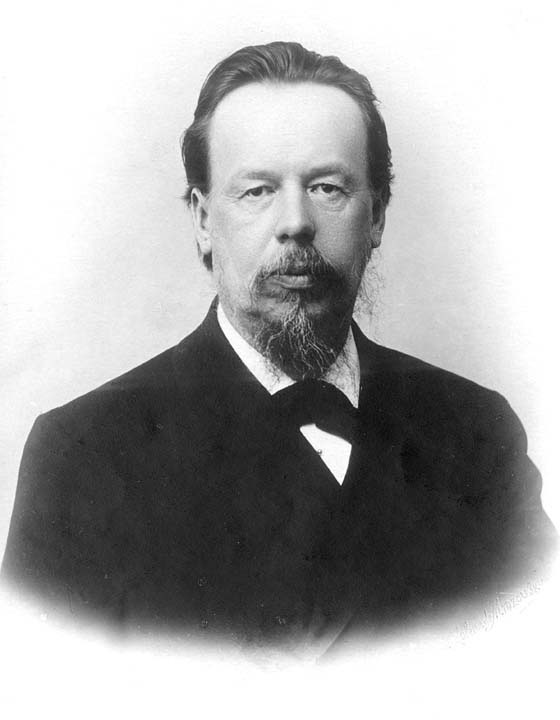- Alexander Stepanovich Popov
Infobox Celebrity
name = Alexander Stepanovich Popov

caption =
birth_date = March 4/16 1859
birth_place =
death_date = December 31/January 13 1905/1906
death_place =
occupation =inventor andphysicist
salary =
networth =
spouse =
website
footnotes =Alexander Stepanovich Popov ( _ru. Александр Степанович Попов) (Gregorian:
March 16 1859 -January 13 1906 , Julian:March 4 1859 -December 31 1905 ) was aRussia nphysicist who demonstrated the practical application of electromagnetic (radio ) waves, [cite web|title =Early Radio Transmission Recognized as Milestone|work=IEEE |url=http://www.ieee.org/portal/site/tionline/menuitem.130a3558587d56e8fb2275875bac26c8/index.jsp?&pName=institute_level1_article&TheCat=1008&article=tionline/legacy/inst2005/may05/5w.fhistory.xml&|accessmonthday=16 July |accessyear=2006] although he did not apply for a patent for his invention.Beginning in the early 1890s he continued the experiments of other
radio pioneers, such asHeinrich Hertz . In 1894 he built his first radio receiver, a version of thecoherer . Further refined as alightning detector , it was presented to theRussian Physical and Chemical Society onMay 7 ,1895 — the day has been celebrated in the Russian Federation as "Radio Day ". The paper on his findings was published the same year. In March 1896, he effected transmission of radio waves between different campus buildings in St Petersburg. Upon learning aboutGuglielmo Marconi 's system, he effected ship-to-shore communication over a distance of 6 miles in 1898 and 30 miles in 1899.Birth
Born in the village Turinskiye Rudniki (now
Krasnoturinsk ,Sverdlovsk Oblast ) in theUral mountains as the son of a priest, he became interested in natural sciences early in his youth. His father ensured that Alexander received a good education at the seminary atPerm , and later studying physics at the St. Petersburg university. After graduation in 1882 he started to work as a laboratory assistant at the university. However, due to the bad funding of the university he changed to a teaching job at theRussian Navy's Torpedo School in Kronstadt onKotlin Island .Radio
Beginning in the early 1890s he conducted experiments along the lines of
Heinrich Hertz 's research. In 1894 he built his firstradio receiver , which contained acoherer . Further refined as alightning detector , it was presented to theRussian Physical and Chemical Society onMay 7 ,1895 — the day has been celebrated in the Russian Federation as "Radio Day ". The paper on his findings was published the same year (December 15 ,1895 ). In 1896, the article depicting Popov's invention was reprinted in the 'Journal of the Russian Physical and Chemical Society'. In March 1896, he effected transmission of radio waves between different campus buildings in St. Petersburg. In November 1897, the Frenchentrepreneur Eugene Ducretet made atransmitter andreceiver based onwireless telegraphy in his own laboratory. According to Ducretet, he built his devices using Popov's lightning detector as a model. By 1898 Ducretet was manufacturing equipment of wireless telegraphy based on Popov's instructions. At the same time Popov effected ship-to-shore communication over a distance of 6 miles in 1898 and 30 miles in 1899.In 1900 a radio station was established under Popov's instructions on
Hogland island (Suursaari) to provide two-way communication by wireless telegraphy between the Russian naval base and the crew of the battleship "General-Admiral Apraksin ". The battleship ran aground on Hogland island in theGulf of Finland in November, 1899. The crew of the "Apraksin" were not in immediate danger, but the water in the Gulf began to freeze. Due to bad weather and bureaucratic red tape, the crew of "Apraksin" did not arrive until January 1900 to establish a wireless station on Hogland Island. ByFebruary 5 , however, messages were being received reliably. The wireless messages were relayed to Hogland Island by a station some 25 miles away at Kymi (nowadaysKotka ) on the Finnish coast. Kotka was selected as the location for the wireless relay station because it was the point closest to Hogland Island served by telegraph wires connected to Russian naval headquarters.By the time the "Apraksin" was freed from the rocks by the icebreaker "Yermak" at the end of April, 440 official telegraph messages had been handled by the Hogland Island wireless station. Besides the rescue of the Apraksin's crew, more than 50 Finnish fishermen, who were stranded on a piece of
drift ice in the Gulf of Finland, were saved by the icebreaker "Yermak" following distress telegrams sent by wireless telegraphy. In 1900, Popov stated (in front of theCongress of Russian Electrical Engineers ), : " [...] " the emission and reception of signals by Marconi by means of electric oscillations " [was] " nothing new. In America, the famous engineerNikola Tesla carried the same experiments in 1893"." ["The Guglielmo Marconi Case; [http://www.mercury.gr/tesla/marcen.html Who is the True Inventor of Radio] ".] In 1901 Alexander Popov was appointed as professor at the Electrotechnical Institute, which now bears his name. In 1905 he was elected director of the institute.Death and legacy
In 1905 he became seriously ill, after being very uneasy about the suppression of a
student movement . He died of abrain hemorrhage onDecember 31 ,1905 which corresponds toJanuary 13 ,1906 in theGregorian calendar .A
minor planet 3074 Popov discovered by Soviet astronomerLyudmila Zhuravlyova in 1979 is named after him. [ [http://books.google.com/books?hl=ru&q=3073+Kursk+1979+SW11 Dictionary of Minor Planet Names - p.250] ]ee also
*
Invention of radio
*All-Russia exhibition 1896 Notes
References
* [http://www.ptti.ru/eng/forum/article2.html Alexander Popov: Russia's Radio Pioneer] by James P. Rybak
* [http://www.acmi.net.au/AIC/POPOV_BIO.html Short biographies of Popov]
* [http://chem.ch.huji.ac.il/~eugeniik/history/popov.html Alexander Stepanovich Popov : Life and Inventions]
* [http://www.computer-museum.ru/connect/popovpr.htm Lightning detector and radiostations of Popov's design : history of manufacturing] - article in RussianExternal links
* [http://kinejo.blogsome.com/2007/05/03/aleksandr-popov-1949/ "Aleksandr Popov", Soviet 1949 biopic watchable and downloadable with Esperanto subtitles]
Wikimedia Foundation. 2010.
